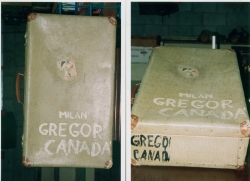Sobey Wall of Honour
Column
13
Row
9
I was born January 29, 1931 in Czechoslovakia. After the 1948 communist coup d'etat I escaped in 1949 to Germany where I worked as a bookkeeper for the International Refugee Organization (I.R.O) - a U.N. body. In 1951 I imigrated to Canada. There are four small episodes tied together with the arrival at pier 21 on May 28, 1951.
To work for a U.N. organization, a displaced person, i.e. a refugee, could be promoted up to an officer level called "second class". A "first class officer" had to be a citizen of a western country, usually an American, a Canadian or a Brit. They all spoke English, some French. When our ship, the M/S Nelly docked at Pier 21 in the early morning, we all came to the shore side of the ship and watched the action below. We heard the dock workers speak English to one another as they were securing the ship with cables. An I.R.O. ex-colleague of mine was standing beside me and with an apparent surprise in his voice exclaimed: "They are all first class officers!"
Each emigrant was allowed 2 pieces of luggage with a limited weight. Being single at that time, I had only one small suitcase. A countryman of mine with a wife and child asked me in Germany, if I would bring to Canada under my name one of his trunks. I agreed. After we disembarked and entered the huge customs hall with Welcome to Canada on the wall in many languages, we each faced a customs officer standing at a low slanted table. Each immigrant had to empty his pockets and place the contents on that table. Then he/she had to open the luggage. When I opened the trunk, I froze, because staring at me was a woman's negligee, a bra and a child's pee-pot! The officer smiled. He knew! But he did not comment.
Following customs clearance, we passed several tables covered with mainly religious literature, but also literature about Canada. The largest table belonged to the Daughters of the Empire. Although many of us could not say "Good Morning" in English, each of us, regardless of linguistic skill or religious belief was handed a King James Bible!
Then we were lead to other tables and received our first nourishment on Canadian soil. Many were still seasick and the texture of the nourishment did not help. Compared to European wieners, the hot dogs were tasteless and the mustard too sweet. Along with the hot dog came a slice of white, square pieces of tasteless sponge. All of us, used to European rye bread or white rolls, did not recognize it as a standard Canadian bread. Today I like it, but only as a breakfast toast with jam. But considering the sheer number of immigrants Pier 21 had to handle (our ship brought 1200; a total of 250,000 in 1951), no computers, no language knowledge, etc., the arrival was well organized and every volunteer and all immigration and customs officers tried their best to make us feel welcome. They knew our anxiety.
By 5 p.m., or about 12 hours after docking, we were on our way to Canada's interior in one of the many CNR trains waiting to be filled across the street from Pier 21.
